Beasts Head for Home Read online
Page 12
With another yell, Kyūzō grabbed hold of Kō’s hair, banging his head against the ground repeatedly. Kō let out a brief groan each time. He seemed to have no idea what he had done. Suddenly his body began shaking, and he vomited up the food he had just eaten. Largely undigested chunks of dry bread, cheese, and sausage spurted out covered in phlegm and white foam.
(“Maybe he’s lost his mind.”)
Kyūzō felt that the feeling in his entire body had shriveled, giving off a dry, rustling sound as it concentrated in the depths of his nostrils and middle of his face. The tears flowed to the back of his throat. As he stood near Kō, who was still shaking, having thrust his face in the middle of the vomited food, Kyūzō began to sob quietly. A thought quickly flitted through his mind: Alexandrov had been kind.
“Young lady.” Kō sang in a soft voice, frothing at the mouth.
Beating his fists on his knees, Kyūzō turned toward the hazy white wasteland and began crying loudly.
His tears soon gone, Kyūzō sobbed convulsively while staring at the fire that was now almost out. It seemed that his emotions had disappeared. The food was effectively gone. Everything was finished. He understood this rationally, and yet for some reason this fact did not feel terribly urgent. Something would come up, he believed. However, there were no doubt people in this situation who starved to death believing to the last that something would come up. They said that no deserting soldier ever returned alive after trying to pass over the Khingan Range. Kyūzō had heard many times of military badges emerging from the bellies of wolves. This is how some people died! I wonder if I’ll also die like this, refusing to believe it until the end.
(“But it’s possible—no, certain—that Alexandrov has heard about the train accident. And he must certainly have sent word to a rescue team to investigate my case. What would he do without a corpse and any knowledge of my whereabouts? For example, he might feel responsible if he suspected that the certificate he had given me had caused trouble, resulting in my being abducted by the Chinese Nationalist troops. In which case, he might send a pursuit team—assuming that such a force exists, and that they were more powerful than the Nationalist troops—to investigate and rescue me. In any case, the escape route for the Nationalist troops was south. The pursuit team would thus come south at some point.”)
Kyūzō would surely die repeating such a fantasy, unwilling to give up hope until the end.
But it’s been a strange twist of fate, he thought. I was abandoned by Kita and his group because I had to take care of my mother. Now I’m about to be abandoned by fate because I’m taking care of a stranger. Even if I’m somehow saved, I won’t take care of anyone ever again.
XV
Afterwards, Kō vomited up the contents of his stomach twice more before immediately falling asleep and snoring terribly. Kyūzō spent the entire night sitting still, mechanically burning kindling. He thought he hadn’t slept at all, but upon realizing that the squawking of the crows had awakened him with a start, he supposed that he might have dozed a bit. There was dark swelling under his eyes from too much crying, and the smudge of the tears made his face appear shrunken. Kō was sleeping in the same place as last night, lying facedown with his chin thrust out. He must have suffered horribly, as his hat had come off and his coat was twisted below his chest. Dried vomit encrusted his entire face, glistening in his beard like frost. The same vomit was also clogging his throat, Kyūzō suspected, judging by the whistling of his breathing. For all that, his breathing was surprisingly regular.
Kyūzō boiled and drank some water. He suddenly felt hunger. He gathered up Kō’s leftover food. There was only enough to fill two hands. He felt an involuntary twitch in his jaw as his back teeth began grinding. As if the small scraps of sausage possessed legs and were about to escape, Kyūzō eagerly stuffed them in his mouth. They were utterly flavorless. It was like tasting lye. If hunger and appetite were two different things and he had no appetite, then he thought that he shouldn’t eat. Hunger, however, would not allow him to stop eating. It was a terrifying thing, far more compulsive than appetite.
Once he began eating, there was no end. He became unbearably anxious to not move his mouth even a bit. This anxiety might be less from hunger itself than from the fear of hunger. It was only after he had consumed nearly half the food that he realized he must stop. He began to think that hunger was like a tangible thing. He was even on the point of believing the ridiculous notion that hunger had taken possession of Kō yesterday and was trying to take hold of him today. He looked for food within hunger in the same way that one seeks light within darkness. His head was filled with the colors and shapes of all kinds of food.
The first thing that naturally occurred to Kyūzō was the fish in the marsh. He could break through the ice and catch them. Suddenly everything was solved. It was so simple that his thoughts became hazy. He walked off to the place where he had broken the ice and began to dig deeper. Ten centimeters had already been shaved off, so the water should be reached by digging another twenty or thirty centimeters. However, the ice was unexpectedly hard compared with the weathered surface above it. He did not mind the labor involved in digging. But he was afraid of how much his hunger would grow through these exertions.
Lying on his belly, his face covered with ice, he dug down strenuously, careful to avoid wasting even the slightest energy. The hole was becoming too narrow. Widening it by digging sideways, he proceeded deeper. After repeated attempts, the resistance he encountered suddenly changed. What he felt was not ice, but neither was it the surface of the water. Putting his hand in and scraping about, he discovered chunks of ice mixed together with slimy blue humus.
Dejected, Kyūzō lacked even the energy to stand up for a while. He remained still for so long that the cold of the ice directly penetrated his skin through his clothes. His exposed wrist was stinging and swollen red. Wiping the ice from his face, he got up slowly, and yet he felt extremely sharp and clearheaded in thinking about the challenge of the marsh.
Quickly taking in the surrounding terrain, Kyūzō saw that the bottom of that part of the marsh would obviously be shallow. The water seemed to be sufficiently deep closer to the cliff.
He marked out a spot just thirty meters from the fire. However, he had no energy left to continue wielding the rock to dig through the ice. Taking out the pistol, he suddenly pointed downward and pulled the trigger. With a brief, dry sound, the ice scattered about. A hole about the size of one’s pinky appeared. It was deeper than the length of one’s finger, but it was not as deep as he had hoped.
Opening the magazine, Kyūzō took out the bullets. He didn’t know what kind of pistol it was, but it was an automatic handgun that fired seven shots in rapid succession. (“Five bullets remained if one subtracted the bullet used to shoot the dog at the brick kiln and the one used now.”) Removing three bullets, two remained. Holding the cartridge with frozen fingers, he used his teeth to detach the front shell of the three bullets. Blood oozed in his mouth as one tooth became loose. He then stuffed the gunpowder in the ice hole. Returning to the fire, he brought back a bundle of thin branches and withered grass. It was quite strange how his next course of action was decided virtually without thinking.
Covering the hole with the grass, he piled on the branches and lit them on fire. Once he was sure that the fire had caught, he quickly ran back. The fire was burning properly. He waited, holding his breath. A long time passed. The flame’s radiance faded and smoke rose up, and then the smoke gradually thinned and disappeared. But there was no explosion.
Cautiously he approached. Clearing away the ashes, he found the wet grass, underneath which had formed a small pool of water. Yes, the heated ice had turned to water.
Enraged, he fired the remaining two bullets. One struck close by and made another hole. His aim was good with the other one, and a spray of water spouted up in the air.
Upon turning around, Kyūzō saw that Kō had propped himself up on his elbow, looking at him. Had he awakened from th
e shock of the gunshots? For a moment, Kyūzō’s eyes shone with pleasure. He stood on his tiptoes and inhaled. Immediately, however, he realized it was hopeless. Kō was a madman. He had devoured all their food. He was beyond control. Closing his eyes, Kyūzō slowly walked back as if the joints in his body were dislocated. Ignoring Kō’s questioning gaze, he sat down with his back to him.
“What happened?”
Kyūzō spat between his legs by way of response.
“I feel like my body is about to break.” Kō’s voice was dry and lifeless, and the words caught in his throat. “What was that sound just now?”
Surprised, Kyūzō looked up. Had Kō regained his sanity? Suddenly all his reproaches came bursting out.
“The sound just now? All right, I’ll tell you. Why are you saying that now? Why now? It’s already too late. I had calculated the provisions, but then you ate five days’ worth of food at once. Something is wrong with you! Understand? Five day’s worth of food at once!”
Kyūzō was so eager to say everything at once that he began to ramble—repeating himself, making leaps, and reversing things in his vehemence.
“All right, I understand.” Kō interrupted weakly, scraping off the crud around his mouth. “I’ve caused you trouble. It’s been a feverish nightmare. Could you give me some water?”
Expecting Kō to be shocked by his words, Kyūzō felt instead that he was being evasive. Kyūzō brusquely pushed the icy cooking pot toward him. Drinking all the water in one gulp, Kō lay back down in exhaustion.
“My body is about to break. And my finger. What’s this? Right, you cut it off for me. Strange how the finger still hurts even though it’s gone. What did you do with the finger after cutting it off?”
“I threw it away over there.”
“Huh. I feel like I’m about to break. Did I sleep a lot?”
“For six days.”
“That’s awful. It’s incredible. Are you still angry at me? What for?”
“It’s fine if you don’t understand.”
Kō narrowed his gaze. Licking his lips, he tried to peer into Kyūzō’s face. His expression was one of suspicion, as if he had just been betrayed.
“Fine. Those who know nothing of the world can be very sure of themselves.”
“The people who are most sure of themselves are rather those who say such things while waiting to die.”
“What! Who’s waiting to die?”
“Didn’t I say that there’s no food left? We’re both going to starve here!”
“You shouldn’t exaggerate so much. But was that sound just now from the pistol?”
“Yes.”
“What happened?”
“I tried to break through the ice and catch fish.”
“Did it break?”
“No, it didn’t.”
“That’s right. You shouldn’t be so wasteful. Those bullets are our lifeline. Are you going to keep your promise and give me back my gun?”
“Here. I used up all the bullets.”
Kyūzō carelessly tossed the weapon at Kō’s feet. Without moving, Kō closed his eyes and, with pursed lips, let out a long breath.
That breath became a sharp needle of regret that pierced Kyūzō’s chest. Damn it, it’s as if I’ve been rushing toward my own destruction with my way of doing things. If I just had a pistol, things might still have worked out somehow. Deep in the marshland there must be rabbits. There should be wolves and wild dogs as well. There might even be deer. If need be, even crows would help.
He secretly stole a glance at Kō. Kō’s face, wan and filthy, was tightly closed, and he lay unmoving as if he were dead. But it’s not just my responsibility! First of all, this man caused everything. And it was only because I took care of him that he even regained his sanity. But he was so optimistic about our food situation just now. It’s possible that he had a solution in mind. But everything has now turned to despair for him. Maybe the pistol really was crucial? It’s as if the two of us are killing each other.
With an audible gulp, Kyūzō swallowed the saliva that filled his mouth. The sound was unexpectedly loud, making him feel beset by a dizzying fear. Again, something was there, approaching much closer now. It was hunger.
The sun reached its height in the hazy southern sky, shining a dull red. Kyūzō knew that this was a sign that the southern wind would blow much harder. In that dull radiance that stirred life he sensed the kind of despair that could rip one apart.
He began running. Climbing up the cliff, he ran around the remnants of the plains fire where he had previously walked. He searched for the burnt mouse that was turned faceup, exposing its white, swollen belly. It had disappeared from where it should have been. He ran his hands through the ashen grass, knowing that the search was futile and yet unwilling to give up.
Suddenly he heard a hoarse voice, like the sound of a dog barking. It came from the bottom of the cliff. Kō was calling to him.
“Hey, take down the flag!”
Peering down, Kyūzō saw that Kō was leaning against the cliff unsteadily, that he had somehow stood up and was tentatively twisting his head back and forth. He was overwhelmed by Kō’s incredible strength of will. When Kō realized that Kyūzō was watching him, he called out in a decisive and almost cheerful tone.
“Take down the flag! Time to leave.”
Sticking out his lower lip, Kō held his breath as he let go of the cliff. With furrowed brow, he made a show of walking a step. Immediately, however, he sat back down.
“Well, let’s leave tomorrow. But in any case, take down the flag. I don’t want to pretend that you’re taking advantage of my weakened condition.”
“But you promised to explain why.”
“All right, fine. I’ll explain.”
Kyūzō didn’t believe this verbal promise. Despite his reservations, he disconnected the pole, breaking it down into its individual branches, and folded up the rope and flag before sticking them in his pocket. Selecting two of the sturdier looking branches, he threw one down to Kō.
“That one should make a good walking stick.”
“I see. Yes, a good walking stick.”
Chapter 3
The Trap
XVI
As Kyūzō climbed up the slope, the trailing sound of Kō’s footsteps suddenly stopped. It was the fourth day since leaving the marsh. Five or six steps behind, Kō appeared as a dark mass as he lay groveling on the ground. Ignoring him, Kyūzō began walking on, but his stride gradually slowed, and he finally stopped in resignation. He tried calling out to Kō, but his voice was now gone. It was easier to walk than to raise his voice. Slowly he made his way back.
“What’s wrong?” he asked in a frozen voice. He placed a hand on Kō’s shoulder as he tried to help him up, but Kō’s body suddenly went limp as he collapsed on his belly. The right half of his face, reflected in the slanting moonlight, appeared puffy and swollen. With each breath, the edge of his lips trembled slightly and the sides of his flattened nostrils expanded and contracted. His overflowing saliva formed white icicles that hung from his unshaven beard. He even seemed to be faintly snoring.
“Wake up!” Kyūzō yelled, using the back of his hand to hit Kō repeatedly behind the ears. His voice stung as it stuck to the back of his parched throat.
Muttering incoherently, Kō twisted his body to escape the blows from Kyūzō’s hand. Tucking his wounded left hand underneath his own body, he gave a hoarse cry and returned to his senses. Clutching Kyūzō’s arm, he jerked himself back up. As he knelt with his head lolling back and forth, he yelled out in a shrill voice, “Hit me again!”
Kyūzō continued beating him with both hands. His senses became dulled—it was just like beating cotton. However, his fingertips hurt so much that they felt like they were broken, the pain reverberating from his shoulders all the way to his ears. And yet it was only this pain that allowed him to confirm what he was doing.
“Enough. Let’s go.”
With a grunt, Kō used his unsteady
hands to block Kyūzō’s blows and then looked fearfully around at the swelling hills of the wasteland, which with its back turned to them gave off a white radiance. “Shit! Let’s go.” Finding his grip on the walking stick, he staggered off with a bent posture, not yet standing fully erect. Around his waist was coiled a rope, which dangled long behind him and at the end of which was affixed his bag. With each step, the bag bounced back and forth as it slid along the ground behind him.
In the darkened minds of the exhausted men, the sound of the bag formed a line like the tracks made by some crawling insect. In fact, Kyūzō repeatedly conjured up the image of an insect slowly crawling from one end to the other of a broad white cloth, and he tried to identify that insect with himself. In this way, he began to feel that his insecure fate had now been given a secure foundation. Perhaps if one calculated the width of a single step as fifty centimeters, then the next step would be one hundred, then one hundred and fifty, two hundred, and three hundred. Eventually growing confused as the number approached ten thousand, he felt secure in approaching that much closer to hope.
It was only this morning that Kō felt that he could no longer carry his bag. As soon as it began to grow light, they came across a long and narrow thicket of bushes in the hollow of a hill. There they built a fire. Rather than try to rest, however, Kō sat there cringing, only his bloodshot eye moving as he anxiously looked around.
“Let me see the map.”
After peering at it for a while, he climbed to the top of a slightly elevated hill in front of them before turning around and beckoning to Kyūzō. Pointing south, he asked in a suspicious tone, “Do you see anything?”
The fatiguing simplicity of the unchanging, desolate plains merely called forth once again a sense of numbing frustration and draining fear. When Kyūzō shook his head no, Kō, goggle-eyed and obviously dismayed, began looking around on the ground as if searching for something.
“These … these are not fields.”
He looked forlorn, as if on the verge of begging Kyūzō to tell him that these were indeed fields. Of course they were not fields.

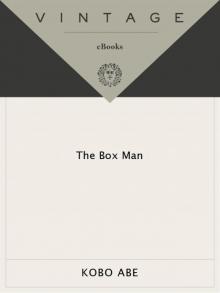 The Box Man
The Box Man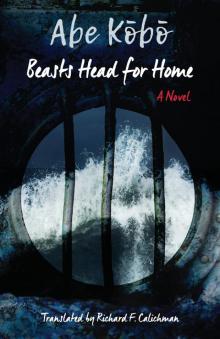 Beasts Head for Home
Beasts Head for Home The Face of Another
The Face of Another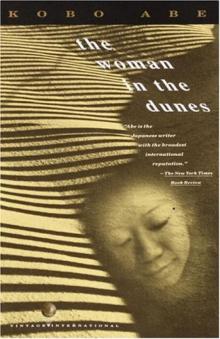 The Woman in the Dunes
The Woman in the Dunes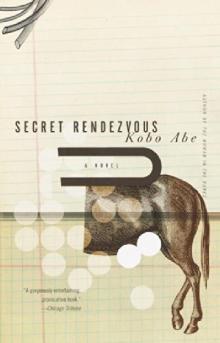 Secret Rendezvous
Secret Rendezvous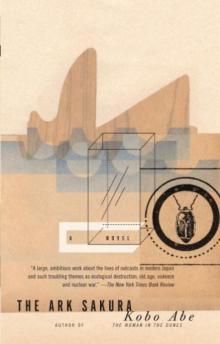 The Ark Sakura
The Ark Sakura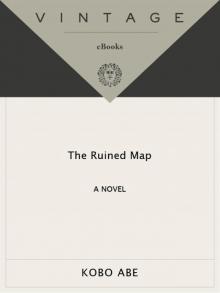 The Ruined Map
The Ruined Map